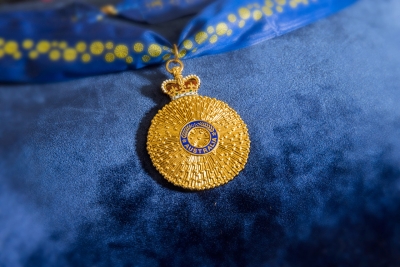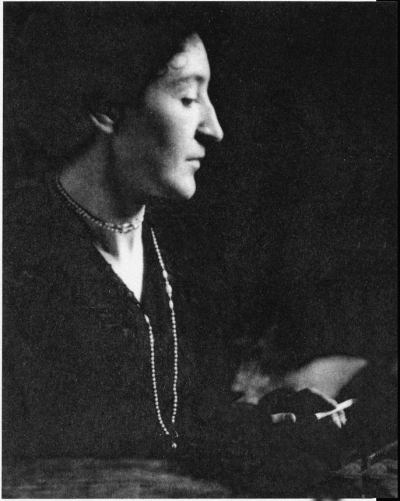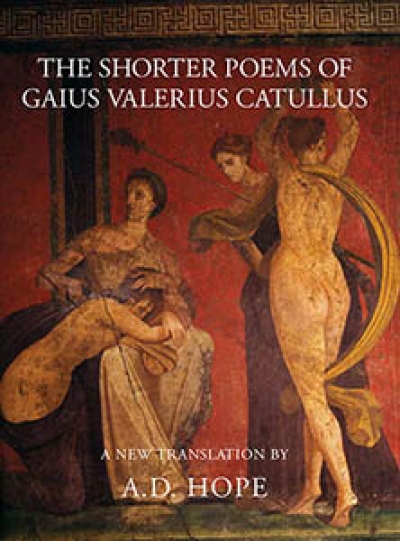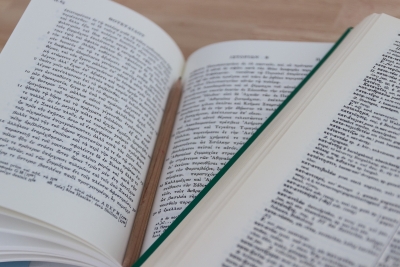Commentary
‘Poetically we dwell …’ Heidegger wonderfully essayed, borrowing a phrase from Hölderlin. The phrase has been in me for a long time, feeding notions of how poetry might be inseparable from a form of life. When I was writing books connected with Aboriginal culture, the poetry seemed to come out of the ground, almost literally. There, in the performance of sacred song, with each step and syllable, a poetic existence was acted out, and all in the open air, a singing of the body in the public place. The ground and the body were painted, but there was no writing to speak of. The poem was voiced from the Dreaming, the poetic key to reality, as W.F. Stanner put it. Everything was vitally connected with everything else.
Lately, I have found myself taken up with a poetic dwelling that belongs indoors or, if not inside, then along a set of thresholds, and with such refinements and thorough literariness, that it presents a whole other illustration of Heidegger’s maxim. For it seems that a thorough-going model of poetic dwelling can be found not just on the ceremonial grounds of the archaic, but in the exquisite routines of the pre-medieval court in Japan, or more particularly, in the world of the shining prince of eleventh-century Kyoto, where, for a hundred years or so, women excelled in the most passionate brushwork, writing their Japanese freely in the tremulous air, you might say – air left to them by the men whose official duties and exclusive rights to formal education obliged them to inhabit the Chinese language.
... (read more)For decades the Bulletin had lurched from one prediction to another of its decline or demise. ‘The Bulletin is a clever youth,’ its co-founder, J.F. Archibald, famously predicted. ‘It will become a dull old man.’ In 1946 a ‘Letter to Tom Collins: Demise of the Bulletin’, by the philologist Sidney J. Baker, appeared in Meanjin. In 1961 the Bulletin unknowingly published Gwen Harwood’s sonnets which contained an acrostic, ‘so long bulletin’.
The execution, when it finally came, was swift. On 24 January 2008, staff were told the magazine would cease publication immediately. A bloodless press release followed. There was no poetry, no clever literary hoax, not even the dignity of one more issue to farewell the readers.
... (read more)Each year on Australia Day, newspaper readers disinter their magnifying glasses and begin to inch down the columns of this year’s national honours like proofreaders at a gala ball. And each list produces its surprises, its gratifications and its absurdities. Normally, ABR doesn’t concern itself overmuch with prizes and such. Laurels grow like grapes in this country. But the absence of creative writers this year was so marked as to warrant comment.
... (read more)As convenor of the 32nd Congress of the International Committee of the History of Art (January 2008), I have become increasingly aware of what others want to know about Australia and of the gaps in our agenda. It is equally clear that there is much that we do very well that is not yet recognised internationally.
... (read more)The year was 1911. Four months after beginning work on a new novel, Henry Handel Richardson admitted to herself the ambitious scope of her new project: ‘I have another Colosse on hand, & it begins to grow, though slowly.’ This aptly nicknamed project was eventually to become the trilogy we know as The Fortunes of Richard Mahony, which was to occupy its author for the next twenty years. Length is not synonymous with ‘greatness’, of course. At almost eleven hundred printed pages, some readers have resented its bulk. At the same time, relatively few have had the opportunity to read the original volumes. Others have been puzzled by its combination of naturalism and allegory, and many more have been struck by an epic quality in its scope and vision. Kylie Tennant assured her readers in 1973 that ‘should any TV producer ever … take the great myth of Richard Mahony into the television medium, a new generation would discover that Mahony is not just a piece of Victorian literary furniture, but has the same weird power to grip an audience as Hamlet or Lear. For if ever there was a myth figure it was Richard Mahony.’ Richardson herself believed that her intention had been ‘to treat the chief features of colonial life in epic fashion’. Dorothy Green argued in 1970 that the novel should be seen as ‘not merely an emigrant novel of early colonial Victoria, but … [as] a part of the intellectual history of European civilisation in the nineteenth century.’ Even so, Michael Gow condensed this epic into a 66-page, two-act, domesticated playscript, performed at the Brisbane Powerhouse and the Melbourne CUB Malthouse in 2002.
... (read more)The Shorter Poems of Gaius Valerius Catullus by Gaius Valerius Catullus, translated by A.D. Hope
Gaius Valerius Catullus (c.87–54 BC) may have died young, but his limited output (only 113 poems and some fragments have survived) has immortalised him as a writer of erotic and satiric verse and savage portraits of contemporaries, so frank sometimes that, until recent decades, editions of his work were customarily heavily expurgated. Innumerable poets through the ages have kept his flame burning. Ezra Pound peppers the opening cantos with references to Catullus. Ben Jonson’s famous ‘Come, my Celia’ is a version of Catullus 5.
... (read more)The world we live in provides us with a great deal of information that is not really intended to inform. We must be informed, for example, that a phone call is being recorded for training purposes. Thus language becomes an accessory to the black arts of spin, propaganda, manipulation and arse-covering. Words are twisted and violated, making it difficult to recover the meanings, the distinctions, that we need. What was clear becomes murky, while murkiness is hidden behind a veneer of false clarity. Protean language becomes complicit in the world’s nefarious purposes.
... (read more)Given V.S. Naipaul’s status in the literary world, and the prolific commentary on him and his writing, you might ask what is different about Gillian Dooley’s book, V.S. Naipaul: Man and Writer. Dooley’s sympathetic attitude liberates both Naipaul and his writing from critical analyses and from critics with explicit post-colonial and political agendas. She is more than aware of how ‘the reductions of political analysis’ have negatively stereotyped Naipaul’s writing. Rather, she focuses on Naipaul’s genius as a writer, which is not separate from the high standard of ethics, courage, fastidiousness, insecurities and prejudices of the man. For it is these very attributes that Naipaul has inherited from his colonial background that make his writing so rich, remarkable and controversial.
... (read more)Kathy Kozlowski
The Library Lion (Walker), by Michelle Knudsen and Kevin Hawkes, is an almost perfect traditional picture book about a gentle creature who becomes enamoured of his local library. It tells a riveting story of misunderstandings made right, and has a really satisfying ending. Guus Kuijer’s The Book of Everything (Allen & Unwin) is an elegant little book, told from the perspective of a sensitive child, whose family is saved from the power of angry religious fervour by neighbourly kindness and common sense.
... (read more)Donald Friend (1915–89) was one of Australia’s most prolific and widely travelled artists. Forty-four of his diaries are held in the National Library of Australia’s Manuscript Collection (individual diaries are held by the National Gallery of Australia and the James Hardie Library of Australian Fine Arts at the State Library of Queensland). The National Library also has items that are part of the important body of work that Friend produced in handcrafting thirteen lavishly illustrated manuscripts, largely in the last two decades of his life: ‘Birds from the Magic Mountain’; ‘Ayam-Ayam Kesayangan, Volume 3’; and ‘The Story of Jonah’ and ‘Bumbooziana’. These projects saw him develop the skills that he had honed for nearly forty years, in his illustrated diaries and earlier publishing ventures, into a highly sophisticated artistic practice, not unlike that of a medieval calligrapher but with the licence to do as he wanted.
... (read more)





